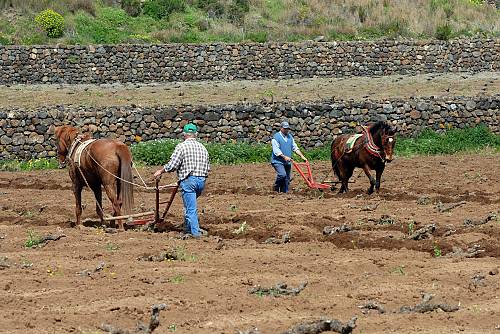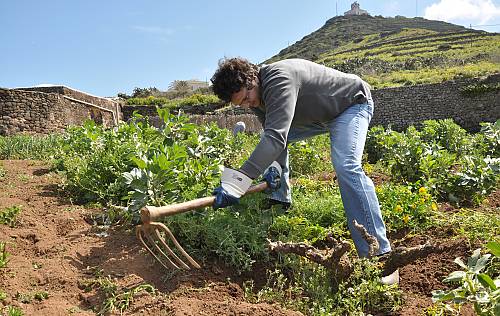Inscribed in 2014 (9.COM) on the Representative List of the Intangible Cultural Heritage of Humanity
1.1 Description of the element
The traditional practice of cultivating head-trained bush vines (”vite ad alberello”) is transmitted through generations of vine growers and farmers of the Mediterranean island of Pantelleria. About 5,000 inhabitants own a plot of land, which they cultivate using sustainable methods. The technique consists of several phases. The ground is prepared by levelling the soil and digging a hollow to plant the vine. The main stem of the vine is then carefully pruned to produce six branches, forming a bush with a radial arrangement.
The hollow is constantly reshaped to ensure the plant is growing in the right microclimate. The wine grapes are then harvested by hand during a ritual event starting at the end of July. The vine-growers and farmers of Pantelleria, male and female, practice ”vite ad alberello” under harsh climatic conditions. The knowledge and skills of bearers and practitioners are handed down in families through oral and practical instruction in the local dialect. In addition, rituals and festivals organized between July and September allow the local community to share this social practice. The people of Pantelleria continue to identify themselves with vine growing and strive to preserve this practice.
1.2 Geographical location and Range of the element:
Pantelleria is an Island which lies at the heart of the Mediterranean Sea, at 70 Km from Tunisia and 85 Km from Italy. Due to its central position, ever since ancient times, the Island has been a crossroads on shipping routes between Africa and Europe. The Island was governed first by the Phoenicians, then by Punics, Romans and finally by the Arabs who gave the Island the name of “Daughter of the wind” (Bent el-ariah).
The constant blowing of the wind, together with the scarcity of rain, has enforced the nominated agricultural practice onto the community of Pantelleria. This lack of precipitations is another feature of the Island, where the average annual rainfall does not exceed 350mm. The element is widespread basically all over the Island, particularly in the characteristic terracings.On an Island of almost 83 km² about 3,000 hectares are cultivated following this original agricultural practice.
1.3 Domain(s) of the element:
Domain(s) of the element as intangible cultural heritage identified according to the Article 2.2 of the Convention:
- Oral traditions and expressions, including language as a vehicle of the intangible cultural heritage
- Social practices, rituals and festive events
- Knowledge and practices concerning nature and the universe
Evaluation Body Decision
Decision 9.COM 10.21
The Committee,
1.Takes note that Italy has nominated Traditional agricultural practice of cultivating the ‘vite ad alberello’ (head-trained bush vines) of the community of Pantelleria (No. 00720) for inscription on the Representative List of the Intangible Cultural Heritage of Humanity:
2.Decides that, from the information included in the file, the nomination satisfies the following criteria for inscription on the Representative List:
R.1:Recognized by the community of Pantelleria as part of its identity, this agricultural practice is linked with nature and the environment; its knowledge and skills are transmitted through time by the islanders;
R.2:Inscription of the element on the Representative List could contribute to international recognition and visibility of intangible culture heritage in general, and more particularly on its link with agricultural knowledge and practices in rural areas, while demonstrating a capacity for creative adaptation to a specific harsh environment;
R.3:Well-articulated measures including education, documentation, research and promotion aim at ensuring the viability of the element and involve the community of Pantelleria as well as local and national institutions;
R.4:Through the direct involvement of vine growers and their representative organizations, the population of Pantelleria participated in the preparation of the nomination, providing its free, prior and informed consent;
R.5:The element was included in the National Inventory of Traditional Rural Practices in 2013, by initiative of the local community, and since 2011 in the Catalogue of the National Rural Landscapes; in 2013, the element was also inventoried in the Intangible Cultural Heritage Register of the Sicilian Region.3.Inscribes Traditional agricultural practice of cultivating the ‘vite ad alberello’ (head-trained bush vines) of the community of Pantelleria on the Representative List of the Intangible Cultural Heritage of Humanity.




